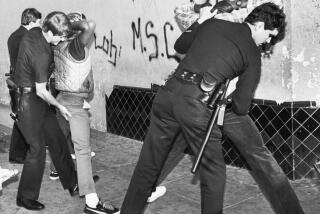Juvenile offenders: Leaving room for hope behind bars
Gov. Jerry Brown has before him SB 9, an important but in the end quite modest bill that would modify life-without-parole sentences for most inmates who committed their crimes as juveniles. The bill would put California, at long last, in the company of most of the world’s civilized societies by recognizing the fundamental difference between juveniles and adults and opening a small window of hope, late in life, for those who perpetrated violent and cruel acts in their youth.
The bill would convert life-without-parole sentences for most of those who committed their crimes before the age of 18 to what would be, in essence, indeterminate sentences subject to review by the sentencing court. But that doesn’t mean these individuals would get off easy. The offender couldn’t even ask for a review until he or she had served at least 15 years, and only if the hearing and then resentencing were granted would the inmate be eligible for release. If the first petition failed, the inmate could next ask for one after having served 20 years. Even those able to get a hearing could remain locked up for life.
Those provisions, by themselves, were the essence of an earlier version of the bill, which should have won passage; it still would have left California among the most stringent punishers of juvenile criminals. But in its final form the bill is even tougher. An inmate would have to prove that he or she acted in consort with an adult or have to fall into other special categories even to be able to apply for a less-than-life sentence. Those convicted of killing law enforcement officers and those convicted of torturing their victims would be ineligible.
California’s criminal justice system worked better when we had indeterminate sentencing, which provided incentives for inmates to reform and incentives for parole and prison officials to monitor their progress. But even those who believe that adults sentenced fairly to life without parole really should live and die in prison, without a single day off for good behavior, need to recognize that juveniles should be treated differently.
Why? Because they really are different. They may have the emotional capacity to be callous, cruel and criminal, but science and society tell us they lack the mental development to give them sufficient judgment to counterbalance their impulses.
Modifying juvenile life without parole does not wipe their slates clean. They must be held accountable for their actions, and they will be, serving at least 15 years behind bars. But they will spend that time with a sliver of hope of eventual release, and incentive to earn it.
Sentencing reform for violent offenders must be handled carefully and modestly. This bill demonstrates how it should be done. Brown should sign it.
More to Read
A cure for the common opinion
Get thought-provoking perspectives with our weekly newsletter.
You may occasionally receive promotional content from the Los Angeles Times.






